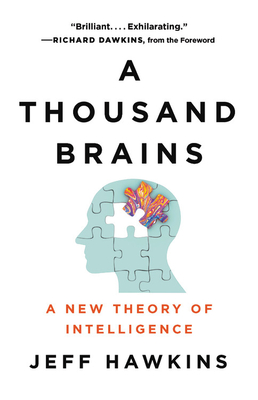A Thousand Brains: A New Theory of Intelligence
author: Jeff Hawkins
related books: Models of the Mind

The main takeaway
Every high school student can understand the basics of natural selection and grasp the origin of the diversity of the living world. Hawkins hopes that the secrets of the minds and intelligence (natural and artificial) might be similarly simple enough to be within reach of every interested layperson. A Thousand Brains outlines Hawkins' theory of the mind.
The main idea is quite simple and seems reasonable with neuroscience. The neocortex consists of about 150,000 columns, where each column is a sensory-motor system. Each column has a similar function: representing part of the external world. These different models are linked using reference frames that connect them spatially, temporally or conceptually. The models are based on these reference frames. Each object or concept is represented by a relatively small number of these columns in a distributed fashion. A voting mechanism creates a consensus interpretation from the individual column results.
The book's first third outlined the above theory and was quite interesting. The next part deals with what it would mean for artificial intelligence. The final third of the book deals with topics as diverse as memes, climate change, brain uploading and colonizing different planets; all put under the umbrella of "human intelligence". I found the last chapters a bit unsubstantial. Other authors have treated this topic in much more depth.
The central theory seems to be coherent and supported by data. However, it seems unclear to me what it would mean practically, i.e. whether it can be used to generate some interesting, nontrivial forms of intelligence. For example, Hebbian learning is a theory used successfully in machine learning. Hawkins claims his framework is similar in spirit to Hinton's capsule networks, which yet have to replace conventional artificial neural networks. I follow the reasoning of Yann LeCun. If you have a relevant theory of intelligence, you should have no problem showing superior performance on various learning tasks.
Who is this for?
Anyone interested in artificial intelligence and brain science. The book is accessible, though it lacks the technical details (for which Hawkins refers to his papers).